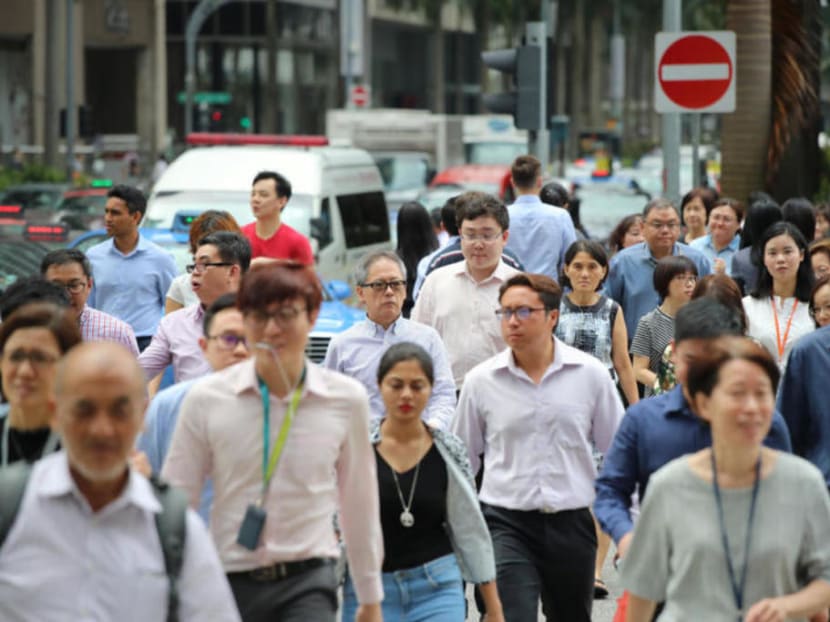Covid-19: No foreign worker levy cuts or waivers as priority is to preserve local jobs, says Josephine Teo
SINGAPORE — The Government has not waived or reduced foreign worker levies amid the Covid-19 outbreak as it wants to focus on preserving local jobs and encouraging restructuring, Manpower Minister Josephine Teo told Parliament on Wednesday (Feb 26).

Manpower Minister Josephine Teo told Parliament on Feb 26, 2020 that the Government's priority is to preserve employment for Singaporeans and to spur restructuring.
SINGAPORE — The Government has not waived or reduced foreign worker levies to cushion the impact of the Covid-19 outbreak because it wants to focus on preserving jobs for Singaporeans and to encourage restructuring, Manpower Minister Josephine Teo told Parliament on Wednesday (Feb 26).
Ms Teo spoke after two labour Members of Parliament (MPs) made speeches calling for foreign worker levy cuts, similar to those implemented during the 2003 severe acute respiratory syndrome (Sars) outbreak.
The MPs are Mr Seah Kian Peng of Marine Parade Group Representation Constituency (GRC) and Nominated MP Arasu Duraisamy, who is a member of the National Trades Union Congress’ central committee.
Nominated MP Douglas Foo, president of the Singapore Manufacturing Federation, said that business operators are hoping for the Government to “extend a further helping hand” by suspending or waiving levy collection for existing work permit holders during this uncertain period.
Ms Teo, however, said that the Government’s priority in supporting businesses is to “preserve local employment”, adding that a levy waiver or a cut “will not benefit the many employers who only have local employees”.
Waiving or cutting levies will also “blunt the motivation” among businesses to restructure, improve job quality and become leaner in manpower, she pointed out. “We would not have seen how industries can rise to the occasion.”
Ms Teo cited the example of the hotel industry that has shown resolve and creativity in overcoming their manpower constraints.
For instance, housekeepers at Copthorne King hotel on Havelock Road no longer waste time knocking on doors to figure out which room should be cleaned and are now notified through a mobile application, which is linked to an in-room control unit that also turns off electrical power when guests have left.
And Andaz Hotel in the Beach Road area no longer has a team of confectioners in its kitchen and instead keeps its customers happy with supplies from Tiong Bahru Bakery and cleverly brands this as part of the heritage experience for guests, she pointed out.
“As much as we want to help businesses, measures to deal with the short-term fallout should not negate longer-term efforts for companies to become less reliant on foreign manpower for growth,” Ms Teo said.
“Levy waivers or reductions would run counter to both objectives.”
The tourism, food-and-beverage and retail sectors, for example, have been hit hard by the Covid-19 outbreak.
Ms Teo reminded the House of the Budget this year where 60 per cent of the S$4 billion Stabilisation and Support Package would go to the Jobs Support Scheme and enhanced Wage Credit Scheme, which would benefit firms with Singaporean staff members.
On the upside, she noted that the Government has not raised levies this time round. They had stayed the same since 2017 for the construction sector, and since 2016 or earlier for other sectors.
The levy rates for workers in the marine shipyard and process sectors were supposed to go up by between S$50 and S$150 in 2018 and 2019, but those increases were deferred.
The levy rate for the basic tier of S-Pass holders is at S$330, while the levy rate for other S-Pass holders is S$650. Levy rates for work permit holders are between S$250 and S$950.
While there is no change to these levy rates, Ms Teo said that the Government had acted to waive levies for employers whose foreign workers are required to serve quarantine, leave of absence or stay-home notices after they have recently travelled to China.
ALTERNATIVES TO NO-PAY LEAVE AND LAYOFFS
Ms Teo said that companies with excess employees should consider other options instead of getting their workers to go on no-pay leave or laying them off.
She highlighted that the Tripartite Advisory on Managing Excess Manpower and Responsible Retrenchment recommends redeploying the workers to other work areas, giving them shorter work weeks, implementing job-sharing, or introducing adjustments to certain wage components.
“These options would at least maintain most, if not all, of the workers’ past incomes,” she said.
For employers with excess foreign workers, the Singapore Business Federation will administer a temporary scheme to help transfer the workers to employers with manpower shortages, she said.
This will help employers whose workers from China have not obtained approval to return to Singapore and employers who cannot hire new workers ho are Chinese nationals due to suspended approvals.
Ms Teo said that companies are already proactively considering such sensible measures that do not just cut costs but save jobs and she is heartened by their efforts.
Some are asking their workers to clear their annual leave or time off, and others are exploring shorter work weeks while getting their workers to for for training to for upskill themselves.
The disease outbreak has sparked a “viral interest” among workers in using technology for alternative work arrangements, she said.
Even mature workers who were struggling to pick up digital tools had found ways to work virtually “almost overnight”, she noted.











